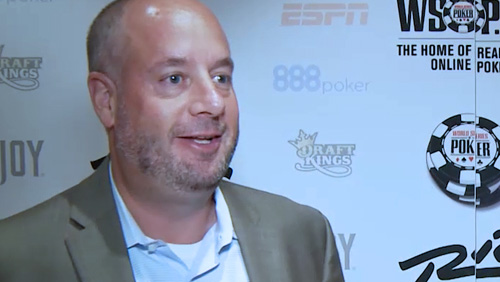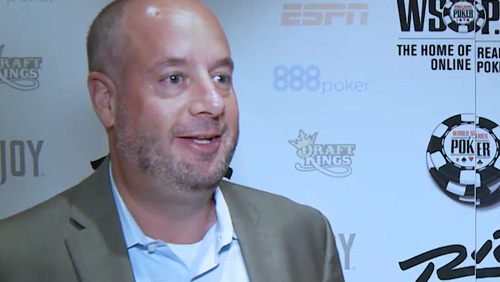Lee Davy sits down to talk to Caesars Interactive Entertainment’s Seth Palansky about the World Series of Poker grind and learns a little empathy in the process.
*To download this audio, right click and save link as*
“Can I have a word?”
It was Seth Palansky.
He looked pissed.
And I knew why.
The night before I had written a critical article about the lack of security in and around the Rio. I hadn’t checked my facts with Seth, or anyone else within the World Series of Poker (WSOP) team. Like I said, he was pissed. I couldn’t see a problem.
A few years later, and I make a fairly obvious mistake in an article. Instead, of someone reading it and telling me on the QT, my mistake was retweeted to more eyeballs than I care to remember.
 So that’s the problem.
So that’s the problem.
Sometimes you have to feel the pain before you can recognise it in others. I know that now. Today, when I watch Seth Palansky scurrying around the Rio respect pours out of my dry eyes.
I have been coming to the greatest tournament in the world for six years. Only, it doesn’t feel like the greatest tournament in the world when you are NOT playing poker. And I get days off. God knows what it must be like for Seth and his team.
“It’s been the smoothest WSOP, and it’s my ninth,” Palansky tells me. “There are 5,000 people here right now playing; we have no tables or seats open. We have people trying to get into events in the Pavilion; last minute satellites, players who want to compete in the Daily Deepstack. We don’t have enough room for everyone, and we have the world’s largest poker room. It’s crazy knowing that you can put 5,000 people in here, and it feels almost unnoticeable.”
And it does.
There is an eerie silence signifying a job well done. But there are a few shades of black starting to circle Palansky’s eyes as he heads into the home straight.
How tough is it?
“It’s tough. I can’t put myself in the shoes of the players, but it feels like a long grind. I have worked at the Olympics, Super Bowls, Heavyweight Championship fights, Indianapolis 500, Daytona 500. I have worked at big events all over the globe, and nothing compares to the seven weeks of the WSOP.”
And when he puts it like that you realise that the WSOP is probably the longest sporting event in the world.
“It never ends. The media centre is running 9 am till 4 am daily. We have 5 hours off a day for 50 straight days. Sometimes it’s like Groundhog Day, but it’s also invigorating. New people are coming in all the time. They pick a few events. The average person plays 1.7 bracelet events. There is a summer camp feel to it. You see people you haven’t seen for a long time. It’s fun. That said, it takes its toll on your family life. I have two young children and a wife and school ends as this starts, but it’s my ninth year now, and they are used to it.”
One of the problems with working at the WSOP is you don’t get enough time to spend socialising with anyone because everyone is either working, heading to work, or, even worse in the case of poker players, heading home from work after busting.
“That’s the most disappointing thing for me. There is not enough social time. If I were in charge, I would make the days end 8-9 pm. There is something to be said for letting the poker end at 8-9 pm and then going to have something to eat; have a drink; see a show; have a better balance and not grind so much.
“When we talk to the recreational player, who is picking a tournament to play, who works a nine to five job, who then comes and plays till 2 am that’s rough. If we could balance it more and allow more social time, it would be great. You want to get to know so many people, but you are like passing ships in the night just trying to keep your head above water,”
And as he talks about recreational players that question pops into my head again. Who are the heroes of the WSOP, and who are the villains? I ask Seth.
“It’s funny because I go back and fore on this. The stories that tug on you are the ones about the everyday person who doesn’t spend tens of thousand of dollars on buy-ins like the pros. And then someone like Fedor {Holz} wins, and you are amazed that this kid is 22 years old; has $18m in tournament winnings; seems mature beyond his years and is enjoying himself.”
And I report the shit out of that fact. I make Fedor Holz out to be the star that he is. So why don’t I do the same for the people who lay the cement from which Holz can create his magic, and how does Palansky feel when guys like me write something derogatory about his event when he is working his butt off and sacrificing so much?
“I respect that everyone has a job to do and has a different vantage point. There is a 360-degree view and its right to have a different perspective because I am looking at it one way and yours is different. There are things we miss; there are times we are running at 100mph and not keeping an eye on things.
“People keep congratulating us on doing a good job, and I say, ‘whoa we still have plenty of time to mess this up.’ You never going to get 100,000 people through events like this; where people are risking their hard earned dollars; in a game; in 100-degree temperature; in a city like Las Vegas, and get through it without issues and problems. Some of them are self-inflicted, some of them are getting us on our bad days or lack of sleep, some of it is poor execution and poor management decisions. We are guilty of all of it.”
And then Palansky reminds me of the need for empathy.
“The Colossus first place prize last year really got to me because I kept thinking about someone winning 1,170 times their buy-in, the most anyone had ever won, in any poker tournament ever, and you are being criticised for it. So in the heat of the moment, I couldn’t understand the criticism.
“And yet, because of that criticism you can look back and realise that you have never had 22,000+ players in an event before and what happened is the expectations of ‘X’ when there is 6-7k people and ‘Y’ when there is 22k people are entirely different. We did a poor job of communicating how that would be even though we knew and understood the payout model. We learn from our mistakes. The issue arises when we are making mistakes and not learning from them.”
So here am I learning from one of my own.
Thank you, Seth, Jack, Ty, Nolan, and everyone else at the WSOP, who help create a career for so many of us. I don’t know about anyone else, but some of my most precious moments were born in and around this tournament including meeting and marrying my beloved wife.
It will always have a special place in my heart, and for that reason, so should the people who temporarily sacrifice their lives so that I can enrich mine.
